Welcome back to another week of the Teaching Kids About Character: An Alphabetic Blogging Series. This week’s topic is X is for eXpresssive. When I think about the trait of being expressive, I automatically think about assertive speech.
Although I’m sure you know that much of communication can also be conveyed through gestures, body posture, and facial expressions, speech seems to hold a power greater than the others in today’s world.
Choosing and using the right words can soothe, calm, befriend, inspire, define one’s boundaries, and show empathy. Using the “wrong” words (or no words at all!) can damage relationships, cause mistrust, invite harm, or even damage your own self-esteem.
This trait out of all the ones we have covered in this series – scares me the most. I want so much for my son to be able to express his needs, wants, and feelings in a positive and assertive way to others.
The problem is, I am far from being the best model for my son in this area, having struggled all my life to learn to speak more assertively.
As it often seems, learning to parent my child, has a lot to do with learning about myself and growing to meet those needs.
Today’s post is a reflection on some of the things I have learned so far, and things I will continue to work on, when it comes to teaching my son to express himself positively and effectively – an incredible SUPER POWER!
The Origins of Assertive Super Powers…
When my son, Onetime, was a baby, I focused on teaching him sign language. It was fun and he eventually learned close to 40 signs. It was fascinating to be able to hold “conversations” with him when he was barely able to babble. And I think it avoided a lot of frustration – as I could understand what he wanted and needed most of the time.
As Onetime became a toddler, and started to use words instead of signs, my emphasis shifted to making sure that he knew that I valued what he had to say.
If I didn’t understand him at first, I asked questions, guessed what he was trying to communicate, and gave him my full and undivided attention when he was speaking.
In this past year, I have watched in fascination as my son has gone from 2 word sentences to some fairly complex, “adult-sounding” speech.
Now, I focus on expanding his vocabulary (“That truck wasn’t just big, it was enormous!“), and more importantly, on modelling the nuances of social speech that will be necessary for him to establish positive relationships and negotiate conflict as he gets older.
How Can We Further Encourage These Powers?
After reflecting, reading, and researching, I composed a list of 5 situations where effective speech powers can make a real difference to a child’s…dare I say it?…LIFE!
Super Power #1: Active Listening
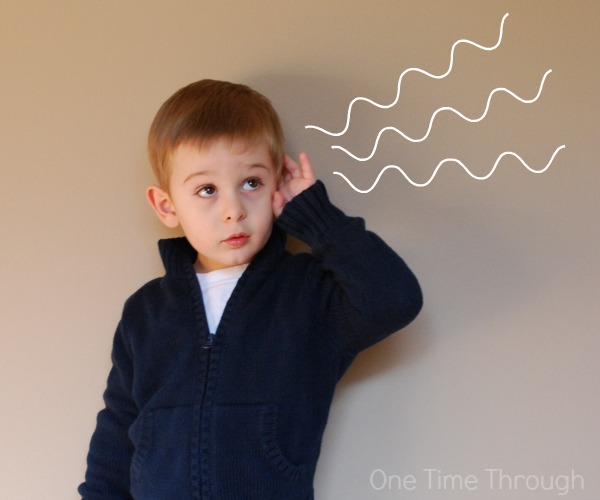
One thing I didn’t cover in that post, was the importance of re-stating what someone says when you are having a discussion where you disagree with another person.
Basically, to show you have fully listened and understood what someone is saying, you can re-state the gist of what they have said, and then ask if you got it right.
To teach this power, I have been simply trying to use it with my son so he can learn how it works. (I also have to use it more with my husband when we disagree, but that’s another post altogether!)
Listening My Way Out of a Potential Conflict…
For example, earlier today, my son and I were outside for a walk. It was a beautiful sunny Fall day here in Ontario, Canada and it was time to head inside for dinner.
Earlier this morning, we had raked up a huge pile of leaves on the front yard and Onetime didn’t want to come inside. He wanted to jump and play some more!
After asking him to come inside, and him adamantly refusing, I asked him why he wanted to stay outside so badly. He said something like, “I want to jump in the leaves. They will all blow away tonight!”
So, I did the re-stating thing and said, “Oh…I see. You’re worried that the leaves will blow away and you won’t be able to jump in the big pile again tomorrow? Is that right?”
He nodded.
Then I expressed my concerns. “I’m worried that if we don’t head inside soon and start supper, we’ll get to bed too late tonight.” He kind of looked at me and took in what I was saying.
Then, we had a quick chat about how if the leaves had blown out of the pile tomorrow, we could rake them back up again to jump in. After that, he was happy to have 2 more jumps and then came in without any further argument.
Sometimes, just feeling heard can make all the difference to how you feel, right?
My hope is eventually, if I do enough re-stating with my son, it will eventually become a part of his dialogue too.
Super Power #2: Protecting Physical Rights

It’s defined loosely as the physical space around our bodies that we assume belongs to us and we become uncomfortable if people enter it with whom we are not closely intimate with. To read more, check out Wikipedia’s article on personal space.
Everyone’s personal bubble is a different size, and it can even differ between cultures.
It’s important to realize that kids have the right to a personal bubble, and they can be taught to defend their physical bodies and their bubble effectively using words.
The Master of Bubble Defense
At the mall the other day, I overheard a little girl in the play area shout out, “DON’T hit me!” quite loudly. In fact, she said it a number of times while chasing the little boy away who had whacked her accidentally with his arm. It was quite amusing, as you can imagine!
I thought to myself, “Now, there’s a kid who’s not going to get picked on as she gets older!” At the age of 3, this girl already had a very strong sense of her personal bubble. She clearly knew her right for no one to touch her physical body without her permission.
Although she clearly got carried away, and probably began scaring the boy, the tone of her voice carried weight and I had to admire her.
Give your child these words to use (or something similar, maybe “I don’t like being hit/pinched/poked/tickled!”). And talk with them about accidents and the intentions of others.
Other assertive phrases to teach your child:
“I need more space!” To use when their personal bubble is being invaded.
“No thanks. I don’t like hugs/kisses.” To use when they are uncomfortable giving out a hug or kiss to relatives, friends of the family, etc.
(This perfect phrase came from an excellent article on the Picklebums blog called, Please Don’t Kiss Me: Respecting My Child’s Personal Boundaries.)
Super Power #3: Protecting Emotional Rights
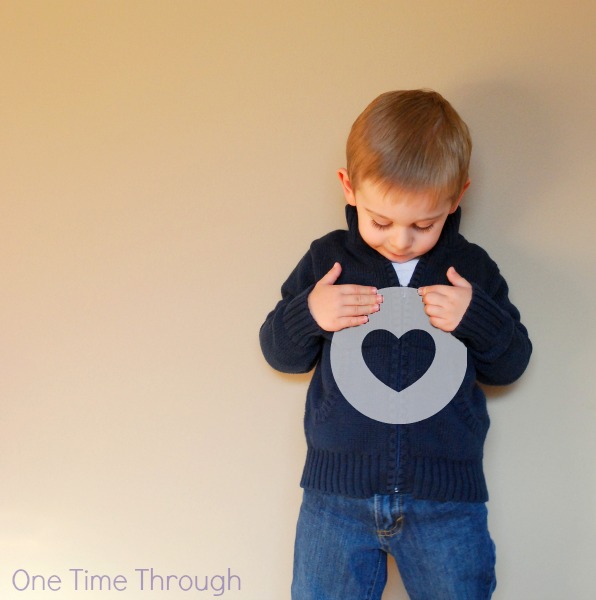
When people say or do things that hurt us or give us an uncomfortable reaction (usually felt in the pit of the stomach), an emotional boundary has been crossed.
It’s important to teach our kids to listen to their gut feelings and to respond to them assertively. If they ignore these feelings and allow others to cross their boundaries, their self-esteem takes a negative hit. An obvious real-life example of this, especially for school-aged kids, is bullying.
As a teacher, I have consistently seen over the years, that the students that can defend themselves confidently verbally, are much less likely to be bullied than the kids who either say nothing to defend themselves, or emotionally react with anger or sadness.
Here are two fantastic sites with a whole slew of phrases you can teach to your child (and practise) to help them defend their emotional boundaries!
7 Parenting Solutions for Raising Assertive Kids Who Can Speak Up For Themselves
Assertive Phrases for Standing Up to Bullying
Check out this earlier post of mine related to teaching kids to be CONFIDENT.
Super Power #4: Asking for Needs To Be Met
“I don’t want to go today, Mommy!” said my son emphatically a few months ago. We were getting ready to go to the local play-center where I participate in parenting workshops and he is cared for by some fantastic ladies.
He usually loves going and I was surprised.
When I asked him why, he told me that they played the music too loud. My son is sensitive to loud noise and it often makes him uncomfortable or anxious.
After thinking about it for a second, I said, “What can you DO if the music is too loud today?”
He looked a little lost and so I suggested he cover his ears with his hands and we practised.
Then I asked, “What can you SAY to the ladies if the music is too loud again?” and again, he looked at me with a clueless expression.
So I suggested he say something like, “I don’t like the music. It’s hurting my ears!” and we practised that.
When we got to the play center, I privately pulled one of the caregivers aside and explained the situation and what I had coached my son to do.
I asked her to be aware of my son’s response and to help him assert himself if he seemed uncomfortable again. Before I left, I asked Onetime to show me again what he was going to do if the music bothered him and he did.
Did My Coaching Work?
After the workshop was done for the day, I went to pick up Onetime. His caregiver told me that he had used the phrase I had given him, as well as covered up his ears without any prompts from her.
I was really proud of my son and when I asked him how the play session had gone and if the music had bothered him again, he replied, “[It was] good. I covered my ears and said, I don’t like loud music.”
“What happened then?” I asked. And he told me that the ladies had turned the music down and it was fine.
The Power of “I” Statements
There is power in teaching children to use “I” statements from a young age.
When you start a sentence with, “I feel…” or “I think…”, or “I don’t like it when…” – no one can argue with that because we all have the right to our own unique feelings and thoughts.
An “I” statement doesn’t place blame or criticize. It simply shares information.
However, it can have a powerful effect on others.
As I mentioned earlier, I fear I am not the best model in this area. So, I am personally focusing on trying to use I-statements when talking with my son, and within my family.
I figure that the more I work on assertively expressing myself, the more likely my son will come to learn this power himself.
Super Power #5: Saying “NO” Assertively
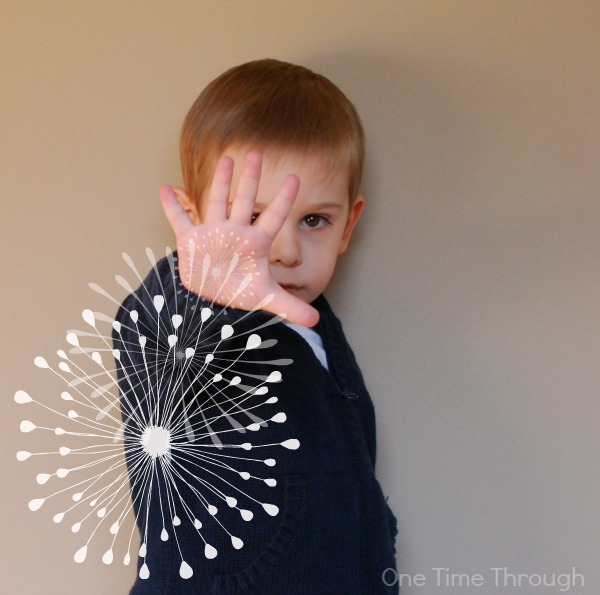
You may have just had thoughts run through your head like…
“What? She wants to teach her son to say “No!” Don’t toddlers and preschoolers do enough of that? Is she sadistic or just plain crazy!?”
Questioning Our Kids’ Right to Say NO
Well, here’s the thing though.
If we don’t allow our children to say no to us sometimes (and have us respect their boundaries), they will never be able to stand up to their peers, potential abuse by future partners, bosses, or god-forbid, someone that wants to physically or sexually abuse them.
Maybe “No” isn’t such a bad thing after all…
Maybe – when our kids tell us that they don’t want to wear this, or do that, or eat this, or go there….maybe just sometimes – or maybe even many times – we need to listen and respect that?
Now there are always going to be times when our kids just have to do things they don’t want to do, or that make them uncomfortable, or upset (and I’ve got some great strategies here to use in those situations).
But if we want our kids to learn to listen to their guts and be comfortable expressing their own limits, and standing up for them, we need to let them practise that skill from a young age.
Assertive Phrases to Teach
Teaching them simple non-offensive phrases to say like, “Thanks, but no thanks,” and, “No thank you,” and, “I’ll think about it,” and “I don’t like…” will help them negotiate so many obstacles in the road of life.
If they learn that we value their personal boundaries, then they will come to believe and expect (correctly) that everyone should also respect their personal boundaries.
Sticking up for themselves and saying “No” when being offered a cigarette for the first time, or getting in a car with a drunk friend behind the wheel, or when asked if they want the proverbial “candy” by a stranger, will not be a foreign language.
Our kids will not be such easy prey.
Keeping our eyes always on how we want our kids to BE as teens and adults, and allowing those developing behaviours now, isn’t always an easy task. But it’s an important one – especially if we want our kids to grow up to be emotionally healthy and assertive.
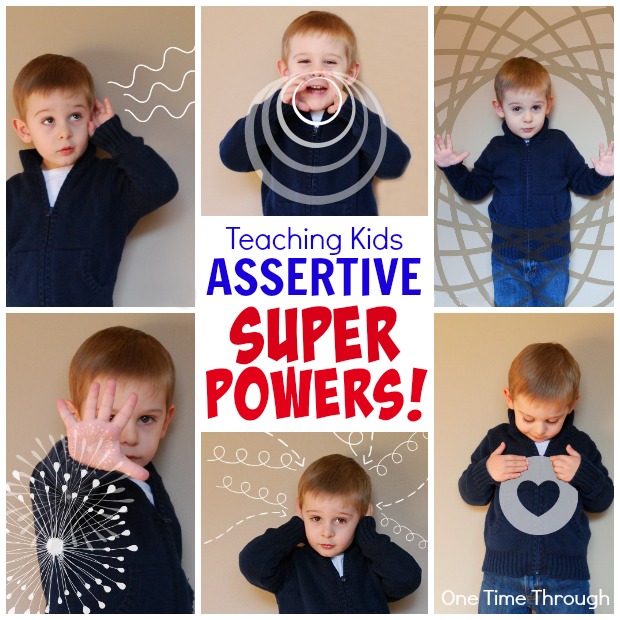
To keep following our alphabetic journey, and to find all our posts from A to Z – visit our Character Series page.
Cheers to raising SUPER KIDS!
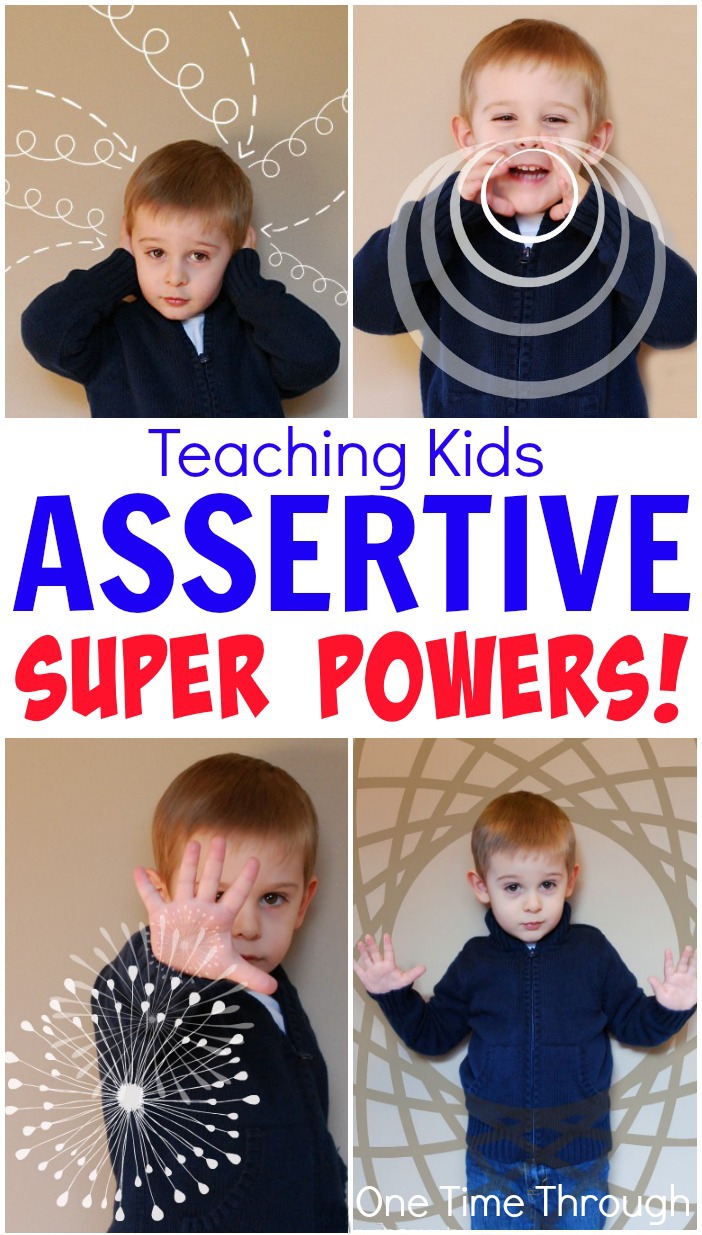

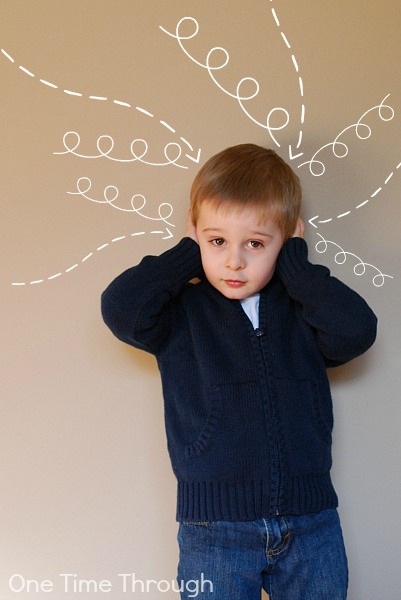


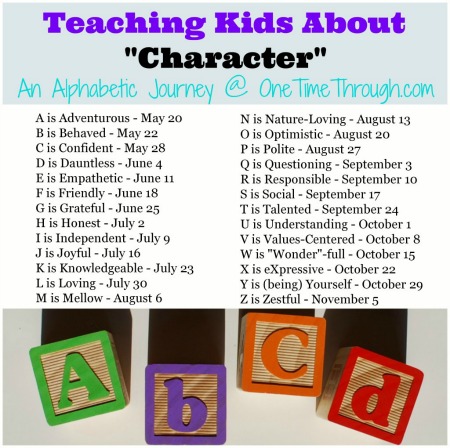

LOVE this article… such important things to teach our kids!!
Thanks Kate! Glad you dropped by and liked the post. Your feedback means a lot! Best, Sue
What a great post!!! I’ve been worried about assertiveness too. My daughter seems to follow whatever the “big girls” tell her to do at preschool whether she wants to or not.
Yes, that’s a tough situation Anne – especially when you’re not there with her. I’m glad you like the post and hope some of the ideas help! Best, Sue